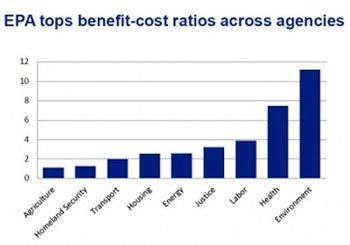As Gina McCarthy struggles to pass muster with Republicans as President Obama’s nomination to head the Environmental Protection Agency (EPA), research shows how effective the agency is.
Although the EPA is probably the GOP’s favorite target for its "job-killing" regulations, the Office of Management and Budget’s (OMB) annual report to Congress shows the fallacy of that – for the second time.
Each year the OMB analyzes the benefits and costs of all major rules adopted by federal agencies over the past 10 years to evaluate how efficiently (or inefficiently) they are functioning.
According to the OMB, the EPA comes out on top this year and in the past several years. Benefits outweigh costs more than 10 to 1 for all major EPA regulations adopted in the past decade.
That means for every dollar invested, Americans get $10 worth of benefits.

—
by Gernot Wagner writes in an Environmental Defense Fund blog:
One of the driving forces behind this conclusion is the Mercury and Air Toxics Standards, an extraordinary achievement for clean air and public health.
Because of these standards, all coal fired power plants will for the first time be required to control their emissions of toxic air pollutants – including mercury, arsenic and acid gases.
40 years after the Clean Air Act signed by Richard Nixon, 20 after the landmark Amendments signed by George H.W. Bush, we are finally getting around to regulating mercury from burning coal.
The analysis of the benefits of reducing mercury pollution demonstrates just how much we underestimate the benefits of environmental protections. For example, when it comes to reducing mercury pollution, the benefits are based on EPA’s estimates of increased wages of (higher IQ) children born to families that catch freshwater fish for their own consumption.
Think about that one for a second. Mercury is a potent neurotoxin in all its forms, but the EPA estimates do not include mercury that is inhaled or that enters our bodies through other means. And there is nothing in the estimates about the fact that mercury harms the brains of our kids, regardless of whether it influences their future earning potential.
In a sense, this analysis is the moral equivalent of arguing that we should have child labor laws because keeping kids in school makes for more productive workers later on. This kind of reasoning, alas, is why economists are often called names unfit for a family-friendly blog. It’s the most reductionist argument you can find in favor of reducing mercury. (In fact, the bulk of the benefits that were quantified by EPA are due to inextricably connected benefits in reducing deleterious particulate pollution.)
Costs, by the way, are relatively well estimated, since businesses are all-too willing to share them. So yes, there are costs – but they are small relative to benefits. And costs, as opposed to benefits, are typically overestimates. They are largely based on current available control technologies. They don’t consider that industry may invent an entirely new and unexpected way of complying with regulations at lower cost. This happens over and over again, and it comes with a name: entrepreneurial ingenuity. Works every time.
These omissions and shortcomings on either side of the equation only stand to bolster the most important claim: benefits outweigh costs more than 10 to 1 for all major EPA regulations adopted in the past decade.
For every dollar invested, Americans get $10 worth of benefits. I’ll take that ratio any day.
++++
Gernot Wagner an economist for the Environmental Defense Fund, and teaches energy economics at Columbia. He is the author of "But Will the Planet Notice?" (2011).
